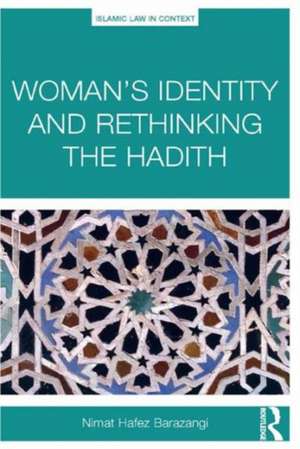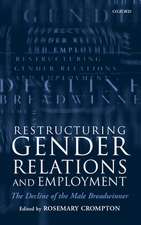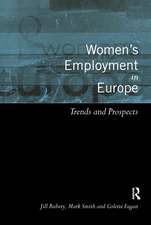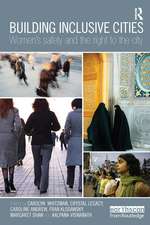Woman's Identity and Rethinking the Hadith: Islamic Law in Context
Autor Nimat Hafez Barazangien Limba Engleză Hardback – 28 oct 2015
| Toate formatele și edițiile | Preț | Express |
|---|---|---|
| Paperback (1) | 443.65 lei 6-8 săpt. | |
| Taylor & Francis – 16 iun 2017 | 443.65 lei 6-8 săpt. | |
| Hardback (1) | 1005.01 lei 6-8 săpt. | |
| Taylor & Francis – 28 oct 2015 | 1005.01 lei 6-8 săpt. |
Preț: 1005.01 lei
Preț vechi: 1225.61 lei
-18% Nou
Puncte Express: 1508
Preț estimativ în valută:
192.37€ • 209.03$ • 161.69£
192.37€ • 209.03$ • 161.69£
Carte tipărită la comandă
Livrare economică 21 aprilie-05 mai
Preluare comenzi: 021 569.72.76
Specificații
ISBN-13: 9781472446787
ISBN-10: 147244678X
Pagini: 248
Dimensiuni: 156 x 234 x 21 mm
Greutate: 0.59 kg
Ediția:Revised
Editura: Taylor & Francis
Colecția Routledge
Seria Islamic Law in Context
Locul publicării:Oxford, United Kingdom
ISBN-10: 147244678X
Pagini: 248
Dimensiuni: 156 x 234 x 21 mm
Greutate: 0.59 kg
Ediția:Revised
Editura: Taylor & Francis
Colecția Routledge
Seria Islamic Law in Context
Locul publicării:Oxford, United Kingdom
Cuprins
Preface; Introduction: woman’s identity and the Hadith: rethinking the sunnah; Muslim woman’s autonomous authority in the Qur’an: khilafa and imama; Corroborating Hadith by the Qur'an: self-identity, testimony, and witnessing; Qaran and talaq in Qur’an, Hadith, Tafseer, and in personal status code; Belief and knowledge, sexuality and slavery, inheritance and custody; Rereading the making of Hadith and rewriting a new perspective on sunnah; Conclusions: will conscientious self-identified Muslim women become active agents?; References; Index.
Notă biografică
Nimat Hafez Barazangi is a Research Fellow at Cornell University, USA where she works on Muslim and Arab Women's Education, Identity Development and Belief System; as well as Feminist and Gender Studies.
Recenzii
'This book is a brave and passionate plea for Muslim women to reclaim the egalitarian message of their faith, which was eclipsed after the Prophet's death by the exclusion of women from positions of leadership and from participation in the production of religious knowledge'
- Ziba Mir-Hosseini, School of Oriental and African Studies, University of London, UK
'Nimat Barazangi in her pioneering work on hadith is following the path of early female thinkers of Islam, reclaiming women’s identity to Islam. The fresh approach found here shifts the traditional boundaries of authority known in the realm of Hadith. Woman’s Identity and Rethinking the Hadith is a must read for Muslim women today.'
- Hatoon Al Fassi, King Saud University, Saudi Arabia, and Qatar University, Qatar
- Ziba Mir-Hosseini, School of Oriental and African Studies, University of London, UK
'Nimat Barazangi in her pioneering work on hadith is following the path of early female thinkers of Islam, reclaiming women’s identity to Islam. The fresh approach found here shifts the traditional boundaries of authority known in the realm of Hadith. Woman’s Identity and Rethinking the Hadith is a must read for Muslim women today.'
- Hatoon Al Fassi, King Saud University, Saudi Arabia, and Qatar University, Qatar
Descriere
This book comprehensively contrasts Hadith with the Qur`an in order to uncover some of the unjust practices by Muslims concerning women and gender issues. Using specific examples the author argues that the human rights and the human development of Muslim women will not progress in a meaningful and sustainable manner until the Hadith is re-examined in a fresh new approach from within the Islamic framework, shifting the discourse in understanding Islam from a dogmatic religious law to a religio-moral rational worldview.
























